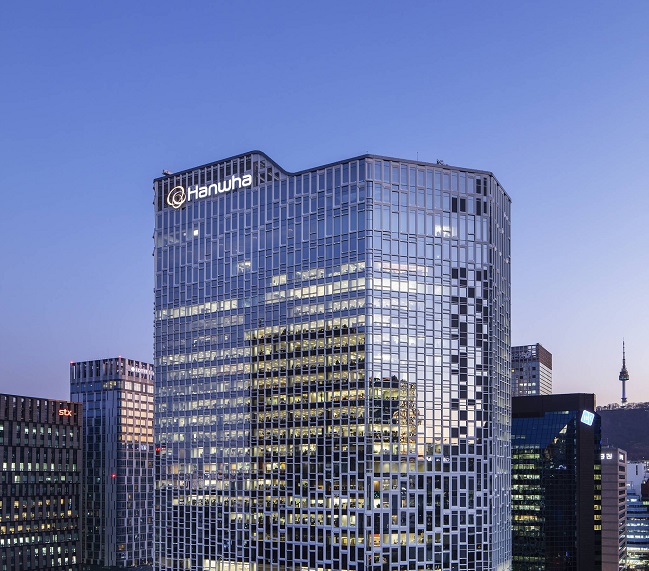Hanwha Solutions 2Q earning hit record high with Qcells solar business turning black
Hanwha Solutions 2Q earning hit record
high
with Qcells solar business turning
black
- Hanwha Solutions recorded
3.39 trillion won in consolidated sales and 277.7 billion won in operating
profits.
- Driven by improved profitability in U.S. and Europe, Qcells solar business turns black for the
first time since 2020.
- Solid profit growth in
the renewable business will continue in the third quarter amid ongoing
expansion efforts in Europe and U.S.

Seoul, July 7 - Hanwha Solutions today announced its business results for the second quarter 2022, reporting the biggest quarterly sales and operating profits aided by improved profitability from its renewable energy businesses including Qcells’ solar business.
The Company recorded 3.39 trillion won in consolidated sales and 277.7 billion won in operating profits in the quarter ended June 30. Compared to the same period a year earlier, sales and profits increased 22 and 25 percent, respectively.
The record quarterly outcome, the biggest of its kind since the Company’s launch in January 2020, was largely attributable to strong demands for solar energy amid soaring fossil fuel prices caused by ongoing geopolitical uncertainties.
“Our extensive business portfolio ranging from petrochemicals to renewable energy has helped us turn the crisis into the opportunities,” said a spokesperson from Hanwha Solutions.
Resilient to uncertainty
By business segments, Qcells, the renewable business division, saw 22.6 percent of year-on-year growth to 1.2 trillion won. Its operating profit increased to 35.2 billion won, marking the first time that the renewable business profits turned black since the third quarter 2020.
The turnaround was largely attributable to increased sales prices of Qcells’ solar panels in the U. S. and Europe, where countries are planning on expanding renewables in their total energy mix to establish secure energy supplies and achieve carbon reduction goals.
The strong demand for solar modules is expected to continue, as fossil fuel-generated electricity prices remain high amid the ongoing geopolitical uncertainties. The market turbulence has sent the fossil fuel prices record highs, accelerating renewable energy transition globally.
For chemical businesses, its revenue increased about 20.3 percent to 1.6 trillion won. While the chemical business’ operating profit contracted 22.2 percent to 228 billion won, the Company’s overall business outcome remain solid thanks to record outcome from renewable businesses.
The contraction in the operating profits stems from the reduced spread between prices of raw materials and petrochemical products. The soaring oil prices has spiked the price of Naptha despite increased sales of Polyvinyl Chloride and Polyolefin.
Regarding advanced material businesses, its sales increased to 299.6 billion won with an operating profit of 16.6 billion won. The result was primarily due to increased sales of solar module component EVA sheet and automobile components. Galleria’s retail businesses, meanwhile, posted sales of 131.9 billion won and operating profits of 3.6 billion won.
“In the third quarter, we are expected to see improved profitability in the renewable businesses, as our sales in the U.S., Europe and other global markets continues to rise,” said Shin Yong-in, Chief Financial Officer of Hanwha Solutions.
Further Expansion in US and Europe
The record outcome in renewable businesses reflects the Company’s expansion in Europe and the US, which have accelerating green energy transition amid mounting calls for energy independence and carbon reductions.
Earlier this year, the Company acquired REC Silicon, which operates massive polysilicon manufacturing facilities in Moses Lake, Washington. The acquisition of the raw solar material producer was followed by expansion of solar module factory in Dalton, Georgia.
Located near the company’s existing 1.7-gigawatt factory in Dalton, the expansion will bring Qcells’ total capacity in the U.S. to 3.1 gigawatts. With the biggest solar manufacturing capacity in the western hemisphere, it will seek to meet the growing solar demand among US consumers.
In Europe, the Company has been expanding downstream energy business. It ranges from developing and constructing solar and wind farms across the continent to operating them for renewable-based power generation.
For that, the Company created a subsidiary dedicated for energy business expansion throughout Europe. The newly-launched Q. Energy is running renewable energy development projects in France, Germany, Spain, Portugal and others. In July, it acquired 500-megawatt development project for solar farms across Germany.
